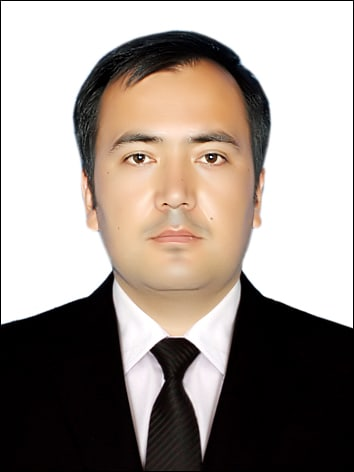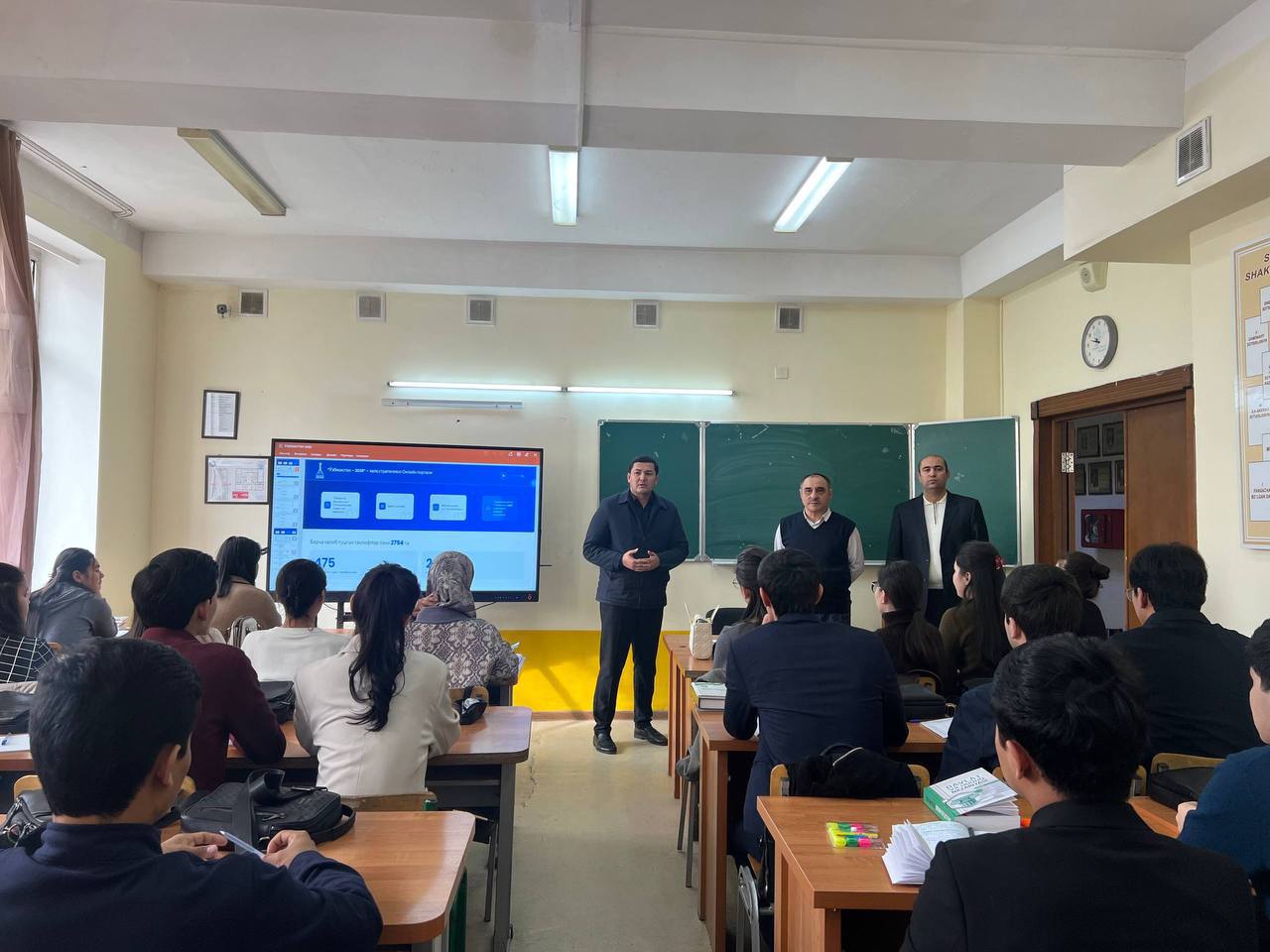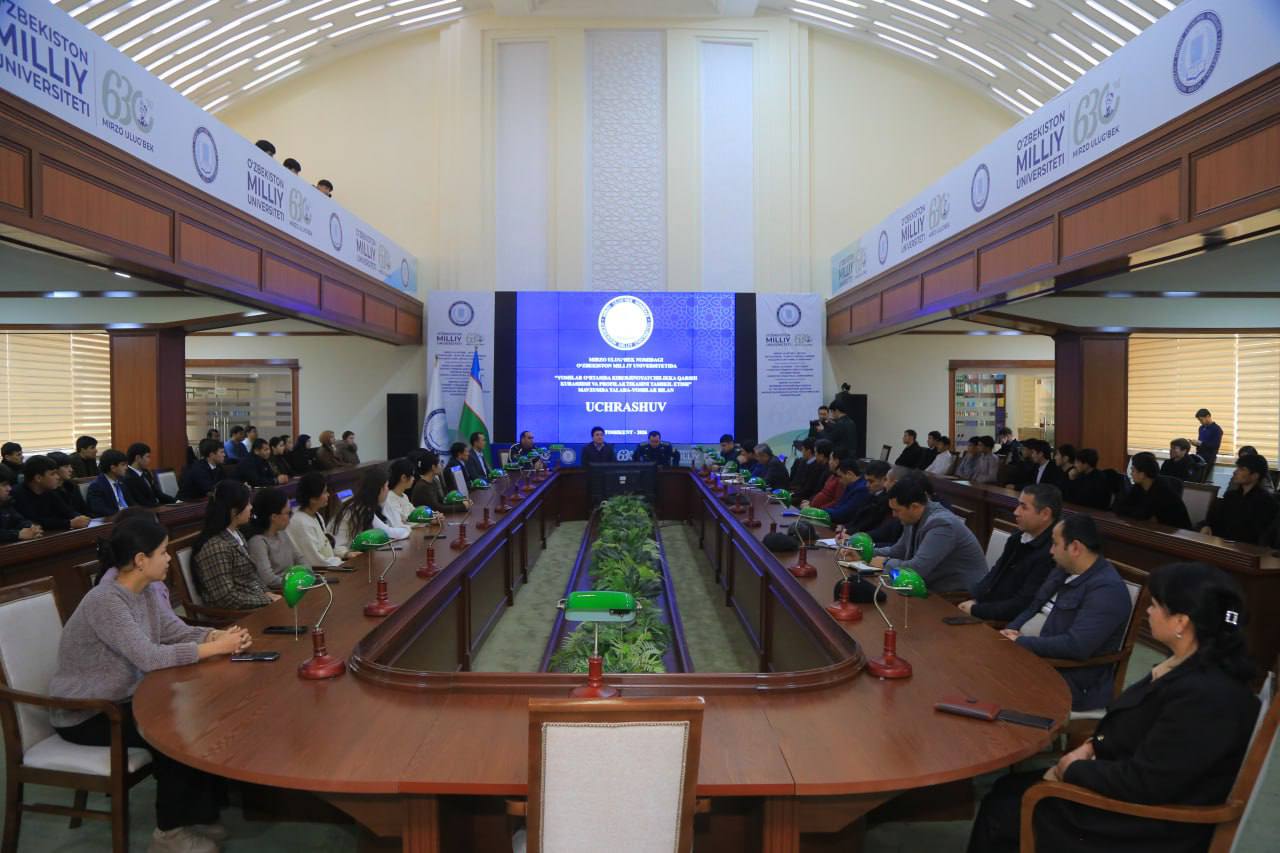
Kuziev Sherali – Head of department
100174, Universitet street 4, Olmazor district, Tashkent
Monday-Friday, 14:00 – 17:00
+998 71 227-15-44
e-mail: kuziev.sherali@gmail.com
Complete information about the history and main directions of the department’s activities, its head.
In 1962. for the first time in Uzbekistan on the initiative of Y.H. Turakulov, the Department of Biochemistry and Biophysics was created at the Tashkent State University. In 1963. the Department of Biochemistry and Biophysics began its work in full, where Y.Kh. Turakulov, D.N. Sakhibov, B.O. Tashmukhamedov, N.K. Mirzaeva, L.I. Kurgultsev. In the same year B.O. Tashmukhamedov was appointed assistant professor of the Department of Biochemistry and Biophysics. In 1964, after graduating from Moscow State University, M.N. Valikhanov was admitted to the Department of Biochemistry and Biophysics as a senior lecturer.
Scientific and theoretical patterns obtained in this area have significantly reduced the incidence of the thyroid gland in Uzbekistan and other neighboring republics. For high merits, Y.Kh. Turakulov, together with his colleague surgeon R.K. Islambekov, was awarded the highest State award for scientific discoveries of that time – the Lenin Prize. In 1965, the senior lecturer of the Department of Biochemistry and Biophysics M.N. Valikhanov successfully defended his Ph.D. dissertation on the topic “Phosphorus exchange during germination of cotton seeds” and continued to work as an assistant professor of the department. In 1966. Y. Kh. Turakulov was elected a full member of the Academy of Sciences of the Republic of Uzbekistan. In 1974, under his leadership, T.S. Saatov defended his doctoral dissertation on the topic: “Thyroglobulin and other iodinated proteins of the thyroid gland.” In 1975 Y.Kh. Turakulov published the monograph “Thyroid hormones”. This monograph has become one of the daily books of endocrinologists and biochemists not only in Uzbekistan, but also in all the republics of the USSR. In 1975 this classic was translated into English and published in the United States. In 1977 M.N. Valikhanov was appointed dean of the Faculty of Biology and Soil Science of Tashkent State University. In 1982 I.N. Sagdullaev defended his Ph.D. dissertation on the topic: “Study of inorganic polyphosphates and some other phosphorus compounds of cotton. “Scientific advisers – academician Y.Kh. Turakulov and prof. M. N. Valikhanov.
Under the leadership of Acad. Y.Kh. Turakulov and b.f.d. S.K. Khalikov S.N. Dalimova defended her Ph.D. dissertation on the topic: “The action of thyroid hormones on the adenylate cyclase system.” In 1989 K.A. Sadykova under the guidance of prof. M.N Valikhanov successfully defended her thesis on “Regulation of ion transport in the root system of cotton”.
In 2000 G.B. Umarova at the specialized council of the Research Institute of Biochemistry of the Academy of Sciences of the Republic of Uzbekistan under the guidance of prof. M.N Valikhanov successfully defended her dissertation on the topic: “Dephosphorylation of phytin by soil micromycetes”
In 2001, the Department of Biochemistry was headed by Doctor of Biological Sciences, Professor Surayyo Nugmanovna Dolimova. In 2002, M.M. Umarova, under the guidance of associate professor Abdullaeva M.M. successfully defended her dissertation on the topic: “Study of some enzymes of phosphorus metabolism in ripening cotton seeds.” In 2006, M.M. Abdullayeva, with the scientific advice of prof. M.N Valikhanova successfully defended her doctoral dissertation on the topic: “Some regularities of the transformation of phospholipids in the seeds of cotton and other higher plants in the processes of germination and maturation.” In 2008 G.M. Mukhammadjonova under the guidance of prof. S.N Dalimova successfully defended her dissertation on the topic: “Research of various polyphenols on proliferative processes and the functional state of liver mitochondria in chronic hepatitis.” In 2009 D.T. Turaeva under the guidance of prof. S.N Dalimova successfully defended his Ph.D. dissertation on the topic: “Study of the pharmacological properties and mechanism of action of Lagovin’s hemostatic.”
From 2012 to 2017, the department was headed by the associate professor of the department G.B. Umarova. On November 25, 2015, a scientific-practical seminar “Modern problems of biology, ecology and soil science” was held, dedicated to the 80th anniversary of Professor Mukhsin Nabikhanovich Valikhanov. On November 10-11, 2016, a scientific-practical conference “Actual problems of physical and chemical biology and endocrinology” was held, dedicated to the 100th anniversary of the academician of the Academy of Sciences of the Republic of Uzbekistan Yolkin Kholmatovich Turakulov.
Today, the scientific school created by Yolkin Kholmatovich Turakulov includes talented research scientists. These scientists are the leading biochemists of Uzbekistan and pass on their knowledge and experience to their students.
Currently, the head of the department is PhD Kuziev Sherali Nasrullaevich. In 2020 Sh.N. Kuziev under the supervision of prof. S.N Dalimova defended his thesis for the degree of Doctor of Philosophy (PhD) on the topic: “Age-related changes in the functional state of rat mitochondria and the effect of herbal preparations on them”. According to the results of scientific research by Sherali Nasrulloevich Kuziev, more than 35 scientific works have been published, including 15 scientific articles published in prestigious journals of the republic and abroad, more than 15 theses and articles have been published at international and republican scientific conferences.
Disciplines taught at the department, separately for bachelor’s and master’s degrees.
| № | Item name | Brief information about science |
| 1 | Biochemistry and Molecular Biology | The purpose of teaching the subject is to teach students the theoretical foundations of knowledge about biochemical processes in the body and the cell, the basic concepts and categories of biochemistry, the laws and principles of biochemistry at the level of the body and the cell, and the ability to apply them in practice. |
| 2 | Biology teaching methodology | The subject “Methods of Teaching Biology” provides students with theoretical knowledge, practical skills, a methodological approach to biological phenomena and processes, as well as the formation of a scientific worldview. |
| 3 | Enzymology | The aim of teaching the course “Enzymology” is to understand the role of chemical processes in the body and to study them using modern research methods. |
| 4 | Hormonal regulation of intracellular processes | The purpose of teaching the subject is the formation of fundamental concepts, knowledge, skills and qualifications based on modern information about the structure of hormones, properties, the course of life processes in living organisms (microorganisms, plants, animals, humans), mechanisms of regulation of activity, their importance in cell activity, unity anabolic and catabolic processes. |
| 5 | Functional biochemistry | The purpose of the subject is to teach masters the basic provisions, categories, concepts and foundations of functional biochemistry, for example, blood biochemistry, the role of blood in metabolism, muscle biochemistry, muscle function in energy supply, biochemistry of nerve tissue, the formation of nerve impulses and the biochemical basis of the transfer of nerve impulses. |
| 6 | Lipid biochemistry | The purpose of the subject is to teach masters the basic provisions, categories, concepts and foundations of functional biochemistry, for example, blood biochemistry, the role of blood in metabolism, muscle biochemistry, muscle function in energy supply, biochemistry of nerve tissue, the formation of nerve impulses and the biochemical basis of the transfer of nerve impulses. |
| 7 | Enzymatic catalysis | The purpose of the subject is to teach students the basics of enzymatic processes, which are the foundation of biotechnological industries of any complexity, as well as in the formation of the skills to apply them in practice. |
| 8 | Basics of glycobiology | The purpose of the subject is to teach students the basic provisions, categories, concepts and fundamentals of glycobiology (glycoproteins, glycans, immunoglobulins and other components of complex carbohydrates), as well as in the formation of the skills of their application in practice. |
| 9 | Biochemistry of vitamins | The purpose of the subject is to teach students the basic provisions, categories, concepts and fundamentals of the biochemistry of vitamins, as well as in the formation of the skills to apply them in practice. |
About researchers and scientific works
| № | Full name researcher teach | Academic degree, title | Dissertation topic |
| 1 | Dalimova Surayyo Nugmanovna | Doctor of Biological Sciences, proffesor | Regulation of mitochondrial and nuclear action of thyroid hormones by cytoplasmic (protein) components |
| 2 | Abdullaeva Muborak Makhmusovna | Doctor of Biological Sciences, proffesor | Some regularities of the transformation of phospholipids in the seeds of cotton and other higher plants during their germination and maturation |
| 3 | Umarova Gulbakhor Bazarbaevna | candidate of biological sciences, assistant professor | Dephosphorylation of phytin by soil micromycetes |
| 4 | Mukhammadjonova Guzal Mukhammadjonova | candidate of biological sciences, assistant professor | Study of the influence of various polyphenols on proliferative processes and the functional state of liver mitochondria in chronic hepatitis |
| 5 | Fomina Marina Aleksandrovna | candidate of biological sciences, assistant professor | Biological effects of the dosage form of the drug Tortezin from the blood of the Central Asian tortoise |
| 6 | Kuziev Sherali Nasrullaevich | PhD | Age-related changes in the functional state of rat mitochondria and the effect of herbal preparations on them |
Information about local and foreign partners
Since 2019, we have been cooperating with Professor Andrey Yurevich Abramov, head of department at the Institute of Neurology at the University College of Great Britain (UKPDC). During this time, he conducted lectures, practical and seminars on the disciplines “Fundamentals of neurochemistry” and “Biochemistry of lipids”.
Associate Professor of the South Kazakhstan State University named after M. Auezova, R.E. Aitkulova in December 2021 in the ZOOM format (online), classes will be held for 2nd year students of the direction of education 5140100-Biology of the Faculty of Biology of NUU in the discipline “Biochemistry and Molecular Biology”.
Composition of the department
| № | Full Name | |
| 1 | Dalimova Surayyo Nugmanovna | s_dalimova@mail.ru |
| 2 | Abdullaeva Muborak Makhmusovna | muborakabdullayeva1956@gmail.com |
| 3 | Umarova Gulbakhor Bazarbaevna | gulbahor_umarova@mail.ru |
| 4 | Mukhammadjonova Guzal Mukhammadjonova | muhammadjonova.guzal@gmail.com |
| 5 | Fomina Marina Aleksandrovna | bespma@yanex.ru |
| 6 | Kuziev Sherali Nasrullaevich | kuziev.sherali@gmail.com |
| 7 | Khamdamova Nigora Azamjon kizi | nigora.hamdamova1091@gmail.com |
| 8 | Khamroev Sobir Khusenovich | sobirjon.hamroyev@bk.ru |
Scientific laboratories (if any)
In connection with the visit to the National University of Uzbekistan named after Mirzo Ulugbek at the Faculty of Biology of the Nobel Laureate in Chemistry, Professor of the University of North Carolina (USA) Aziz Sanjar on October 14-22, 2018, the Department of Biochemistry established an interdisciplinary laboratory of molecular biology named after Aziz Sanzhar.
Circles: The “Young Biochemist” circle is a part of the Department of Biochemistry. The circle was created with the aim of improving the quality of educational work, helping to improve the quality and organization of the intellectual, cultural and spiritual development of university students, as well as their leisure time. It is also expected to focus on research activities.


